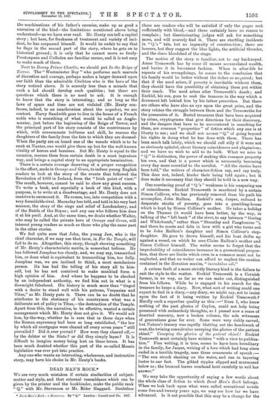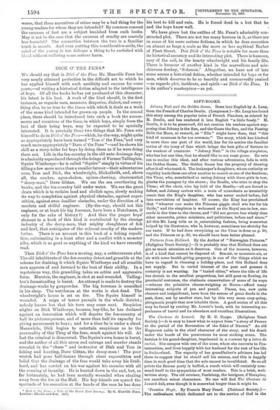DEAD MAN'S ROCK.* WE are very much mistaken if certain
similarities of subject- matter and style, and that external resemblance which can be given by the printer and the bookbinder, make the public rank " Q." with Mr. Stevenson or Mr. Rider Haggard. Doubtless
• Dead Man's Rock: a Romance. By" Q." London : Cassell and Co. 1887.
there are readers who will be satisfied if only the pages reek sufficiently with blood,—and these certainly have no reason to complain ; but discriminating judges will ask for something more, and will scarcely find it. There are startling incidents in" Q.'s " tale, but no ingenuity of construction; there are horrors, but they suggest the blue lights, the artificial thunder, and the sham bloodshed of the stage.
The motive of the story is familiar, not to say hackneyed. Amos Trenoweth has by some ill means accumulated wealth, and buries it in buccaneer fashion. When iu after-life he repents of his wrongdoings, he comes to the conclusion that his family would be better without the riches so acquired ; but that if the need arises, if poverty is inevitable without them, they should have the possibility of obtaining them put within their reach. The need arises after Trenoweth's death ; and Ezekiel, his son, goes to seek the treasure in the way which a document left behind him by his father prescribes. But there are others who have also an eye upon the great prize, and the story relates the struggle between them and the Trenoweths for the possession of it. Buried treasures that have been acquired by crime, cryptograms that give directions for their discovery, and the dangers that have to be encountered in searching for them, are common " properties " of fiction which any one is at liberty to use ; and we shall not accuse "Q." of going beyond his rights in doing what he has done with them. There has been mach talk lately, which we should call silly if it were not so obviously spiteful, about literary coincidences and plagiarism; and we have no wish to add to its bulk. What we miss in " Q." is distinction, the power of making this common property his own, and that is a power which is necessarily becoming every day more essential to the novelist. "All the stories have been told," the writers of character-fiction say, and say truly. This does not, indeed, hinder their being told again ; but it does make it necessary that they should be told in a new way.
One convincing proof of " Q.'s" weakness is his unsparing use of coincidences. Ezekiel Trenoweth is murdered by a certain Simon Colliver, who has previously removed from his path his accomplice, John Railton. Ezekiel's son, Jasper, reduced to desperate straits of poverty, goes into a gambling-house which is kept by Simon Colliver's mother. He takes a holiday on the Thames (it would have been better, by the way, in talking of the " left bank " of the river, to say between " Goring and Whitchnrch," rather than " Streatley and Pangbourne "), and there he meets and falls in love with a girl who turns out to be John Railton's daughter and Simon Colliver's step- daughter. He goes to drown himself, and his boat drifts up against a vessel, on which he sees Claire Railton's mother and Simon Colliver himself. The writer seems to forget that the improbability of coincidences increases in a geometrical propor- tion, that there are limits which even in a romance must not be neglected, and that no writer can afford to neglect the caution contained in the Horation maxim, " incredulue odi."
A serious fault of a more strictly literary kind is the failure to suit the style to the matter. Ezekiel Trenoweth is a Cornish farmer, in no way, as far as we can make out, distinguished from his fellows. While he is engaged in his search for the treasure he keeps a diary. Now, what sort of writing could one expect to find in a diary,—any diary, we might say, not to insist upon the fact of it being written by Ezekiel Trenoweth P Hardly such a superfine quality as this :—" Even I, who know nothing of the past glories of Ceylon, could not help being possessed with melancholy thoughts, as I passed now a mass of deserted masonry, now a broken column, the sole witnesses of generations gone for ever. Some were very richly carved, but Nature's tracery was rapidly blotting out the handiwork of man,the twining convolvulue usurping the glories of the patient chisel." Usurping the glories of the patient chisel ! Ezekiel Trenoweth must certainly have written " with a view to publica- tion." Fine writing, it is true, seems to have been hereditary in the family, for Jasper, writing of a love which had long since ended in a terrible tragedy, uses these ornaments of speech :— "The sun struck slanting on the water, and ran in tapering lustre to our feet. The gilded ripples slipped and murmured below us; the bronzed leaves overhead bent carefully to veil her answer."
We may take the opportunity of saying a few words about the whole class of fiction to which Dead Man's Rock belongs. When we look back upon what were called sensational novels some five-and-twenty years ago, we may see how far we have advanced. Is it not possible that this may be a change for the worse, that these narratives of crime may be a bad thing for the young readers for whom they are intended ? By common consent the excesses of last are a subject banished from such books. May it not be the case that the excesses of cruelty are scarcely less harmful ? The connection between the two is a familiar troth in morals. And even putting this consideration aside, the mind of the young is too delicate a thing to be surfeited with blood without suffering some serious harm.
























































 Previous page
Previous page